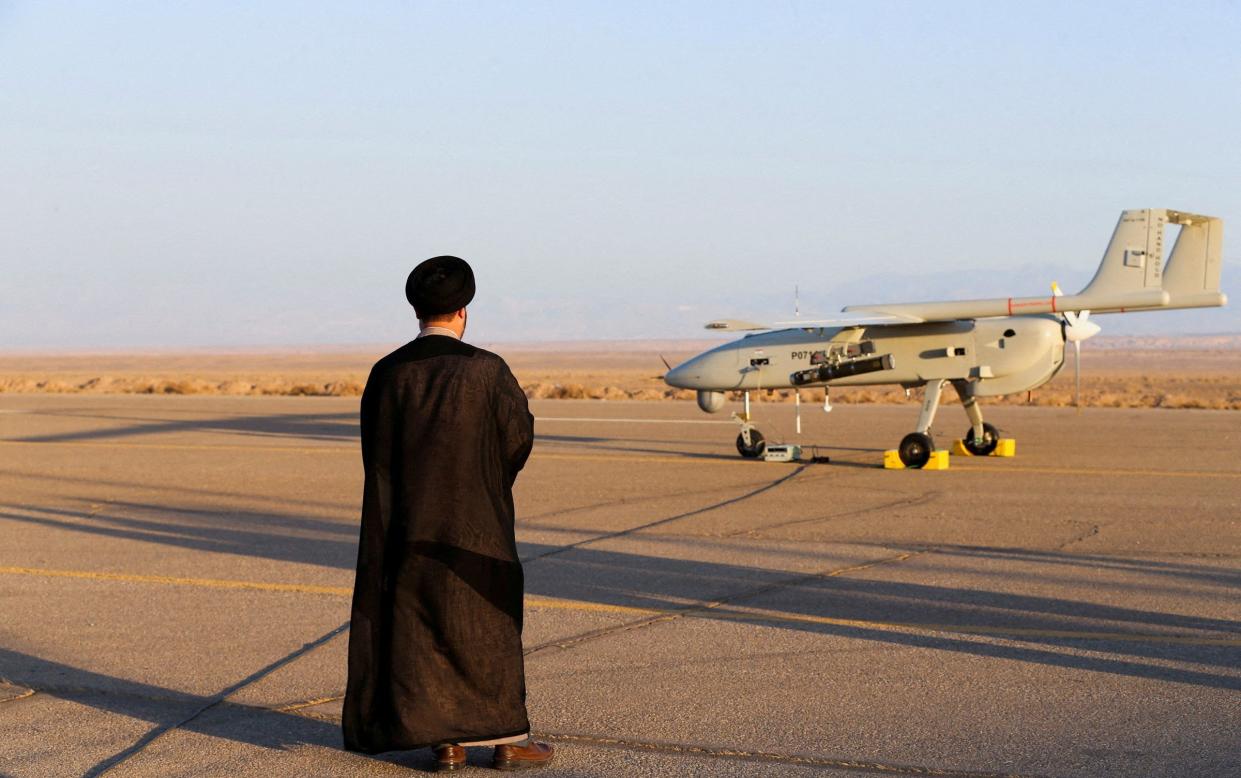Russia hands captured British anti-tank missile to Iran in exchange for drones

Iran was given a captured British anti-tank missile by Russia in exchange for unmanned drones used to attack Ukraine, the Telegraph understands.
The Kremlin handed over £120 million in cash along with state-of-the-art British and US weaponry seized from Ukrainian troops to pay for the drones, a security source has claimed.
The cash and weapons were flown into an airport in Tehran on a Russian military aircraft in the early hours of August 20, Sky News reported on Tuesday night.
On board the Russian military cargo plane were a British NLAW anti-tank missile, a US Javelin anti-tank missile and a US Stinger anti-aircraft missile. Satellite imagery showed two Russian aircraft at Mehrabad airport at 1.17am, having flown in under the cover of darkness. The aircraft remained at the airport for around three hours before taking off.
Iran could copy technology
According to Sky News, the weapons had been intended for the Ukraine military but “fell into the wrong hands”. The suspicion, according to the source, is that Iran will examine the hardware, pull it apart and try to build their own.
The source suggested that the hardline Islamic Revolutionary Guard Corps possessed the capability to examine the weapons, understand the technology and then manufacture it themselves.
"They will probably be reverse-engineered and used in future wars," the source told Sky.
A senior government source did not deny the Sky report when approached by The Telegraph.
On Tuesday night the Ministry of Defence said it was urgently trying to verify the veracity of the claims made on the television channel. “We have not had a chance to go through it [the report] yet and clarify anything that has been alleged. We are trying to assess this and verify the report,” said a British military source.
Western governments will hope to put pressure on Iran to shut down any future deals between Moscow and Tehran.
In exchange for the armaments and the cash, Iran handed over to Russia 160 unmanned aerial vehicles including 100 Shahed-136 drones that have been used to attack Ukrainian cities and infrastructure with devastating effect.
The drones - a cheap alternative to cruise missiles - were launched last month against cities including the capital Kyiv as well as Lviv and Dnipro, targeting the energy network and civilians. The drones, piloted from the ground, explode on impact.
The source told Sky News that a fresh deal worth £175 million for another batch of drones had been agreed between Moscow and Tehran. "That means there will be another big supply of UAVs from Iran soon," the source said.
A fresh bombardment will cause alarm in Ukraine which has staged an effective counter-offensive against Russian troops in recent weeks. Ukraine has used up precious supplies of Western anti-aircraft missiles to repel incoming drones amid calls for the West to supplement stocks.
Justin Bronk, a senior research fellow at the Royal United Services Institute, a London-based think-tank, told Sky: "If Iran hadn't supplied the Shaheds, it would be significantly less effective in terms of the Russian strike campaign against Ukrainian electrical infrastructure and water."
Vadym Prystaiko, the Ukrainian ambassador to the UK, warned on Tuesday night that reports that Iran had also agreed a deal to supply ballistic missiles posed a real threat to his country.
Iran has denied the claim.
The security source told Sky that Russia supplied 100 Shahed-136 drones in August along with 60 smaller Shahed-131 drones and six Mohajer-6 drones. The Mohajer-6 drones can drop or launch bombs or missiles.
Iran copied US drone technology
The source further claimed that Iran had obtained its drone technology after capturing a US drone in 2011. That will further fuel fears it will in time be able to replicate the NLAW and other Western anti-tank and aircraft missile systems.
The source said: "It seems that Iran also wants to benefit from the war [in Ukraine] by receiving from the Russians Western capabilities that will be useful for them in the future - as happened in the past."
Russia and Iran - both diplomatic outcasts - have intensified their relations since the outbreak of war. on Tuesday night a news agency reported that Nikolai Patrushev, Russia’s national security adviser, had arrived in Tehran for meetings with the head of Iran’s Supreme National Security Council.
Tensions between Iran and the UK are already heightened and were further strained over reports that a Tehran-backed hit squad was operating in London to assassinate British-Iranian journalists working for a Farsi-language television station broadcasting in Iran but based in the UK.
On Tuesday protesters against the Iranian regime urged King Charles to shut down Iran’s embassy in London while the monarch was in Bradford during a tour of Yorkshire.

 Yahoo News
Yahoo News 
